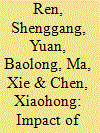|
|
|
Sort Order |
|
|
|
Items / Page
|
|
|
|
|
|
|
| Srl | Item |
| 1 |
ID:
132695


|
|
|
|
|
| Publication |
2014.
|
| Summary/Abstract |
This paper employs the input-output (IO) approach to analyze the scale and structure of embodied carbon emissions of China×s 19 industry sectors during 2001-2011 and constructs a regression model to establish the relationship between energy intensity, per capita output, trade openness, foreign direct investment (FDI), trade comparative advantage, environmental regulation, technology, and CO2 emission intensity. Our results suggest that: China×s international embodied carbon emission balance has been in a state of continuous growth for the period 2001-2011, and China has become a pollution haven; the relationship between per capita output and CO2 emission is inverse N-typed and China×s industries are in the rising stage of the curve; FDI and trade comparative advantage are two main elements boosting China×s carbon emissions; trade openness, environmental regulation, and technology will lower the growth rate of China×s industrial carbon emissions (ICEs). Consequently, China×s policies should center on adjusting the industry structure and scale of FDI inflows, transforming industries with trade comparative advantages into a clean type, facilitating environmental regulation level, and bringing in and developing low-carbon technology to avert China from being a pollution haven.
|
|
|
|
|
|
|
|
|
|
|
|
|
|
|
|
| 2 |
ID:
130542


|
|
|
|
|
| Publication |
2014.
|
| Summary/Abstract |
This paper calculates CO2 emissions embodied in China's international trade using an input-output analysis, for the period 2000-2010. Based on industrial panel data, the two-step GMM estimation is used to test the impacts of FDI, trade openness, exports, imports and per capita income on CO2 emissions. The results suggest that: (1) China's growing trade surplus is one of the important reasons for the rapidly rising CO2 emissions; (2) large FDI inflows further aggravate China's CO2 emissions; and (3) the industrial sector's per capita income and CO2 emission relationship show inverted-U environmental Kuznets curve. Therefore, in order to achieve environmentally sustainable development of the economy, China should make efforts to transform its trade growth mode, adjust foreign investment structure, strengthen energy efficiency and develop a low-carbon economy.
|
|
|
|
|
|
|
|
|
|
|
|
|
|
|
|
|
|
|
|
|